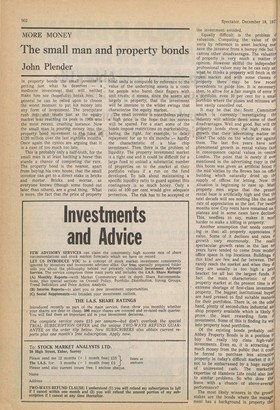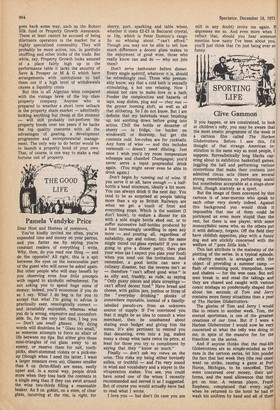MORE MONEY
The small man and property bonds
John Plender
In property bonds the small investor is getting just what he deserves — a mediocre investment that will neither make him nor (hopefully) break him. In general he can be relied upon to choose the worst moment to put his money into any form of investment. The precipitate rush into unit trusts just as the equity market was reaching its peak in 1968 was the most recent, crushing instance. Now the small man is pouring money into the property bond movement to the tune of. £120 million over the last eighteen months.' Once again the cynics are arguing that it is a case of too much too late.
This is probably only a half-truth, for the small man is at least backing a horse that stands a chance of completing the race. The property bond is the nearest, apart from buying his own house, that the small investor can get to a direct stake in bricks and mortar. Bricks and mortar, as everyone knows (though some found out later than others), are a good thing. What is more, the fact that the price of property bond units is computJd by reference to the value of the underlying assets is a tonic for people who burnt their fingers with unit trusts; it means, since the assets are largely in property, that the investment will be immune to the wilder swings that characterise the equity market.
The small investor is nonetheless paying a high price in the hope that his nerves will be spared. For a start some of the bonds impose restrictions on marketability, having the right, for example, to delay repayment for up to six months — hardly the characteristic of a blue chip investment. Then there is the problem of liquidity. The property investment market is a tight one and it could be difficult for a large fund to unload a substantial number of properties on to the market at their portfolio values if a run on the fund developed. To talk about maintaining a specific liquidity ratio to guard against this contingency is so much hooey. Only a ratio of 100 per cent would give adequate protection. The risk has to be accepted or the investment avoided.
Equally difficult is the problem of valuation. Computing the value of the units by reference to asset backing ma) save the investor from a bumpy ride but it carries other disadvantages. The valuation of property is very much a matter of opinion. However skilful the independent professional valuer may be he can only sal what he thinks a property will fetch in the open market and with some classes Of property there may be few recent precedents to guide him. It is necessary then, to allow for a fair margin of error in a portfolio, even 10 per cent for a small portfolio where the pluses and minuses are less easily cancelled out.
It may be that the Scott ,Committee which is currently investigating the industry will whittle down some of these disadvantages. Well and good. But will the property bonds show the high rates of growth that their• advertising matter
plies? The odds on the whole are against them. The last five years have see phenomenal growth in rental values (and in consequence capital values in centra London. The point that is rarely if ever mentioned in the advertising copy is that this boom was given an artificial boost the mid-'sixties by the Brown ban on office building which naturally dried up the supply of offices for letting. Now the situation is beginning to ease up. Mari) property men argue that the present rental base is artificially high and that the next decade will see nothing like the same rate of appreciation as the last. For twelve months now City rents have remained on 8 plateau and in some cases have declined' This, needless to say, makes it mutt harder to make a killing in property.
Another assumption that needs correct' ing is that all property appreciates le, value. Some of it declines and rates 01 growth vary enormously. The mall/ spectacular growth rates in the last ten years have tended to come from modern, office space in top locations. Buildings 01 this kind are few and far between. The rarely reach the market and when they de they are usually in too high a price bracket for all but the largest funds. If fact the main characteristic of the property market at the present time is ne extreme shortage of first-class investment property. The biggest institutional buyer, are hard pressed to find suitable material for their portfolios. There is, on the othee, hand, plenty of second-class industrial and shop property available which is likely te prove the least rewarding form of investment. Some of this is finding its waY into property bond portfolios.
Of the existing bonds probably onlY Abbey Property Bonds is in a position re buy the really top class high-valne investments. Even so, it is attracting 0,
much money from the public that it collie
be forced to purchase less attractive property in today's difficult market if it i1
not to be embarrassed by a huge surplUe of uninvested cash. The marketing expertise of Hambros Life could also lead to similar problems. So who does that leave with a chance of above-average performance?
The most likely winners in the grovAll stakes are the bonds where the manage: ment has a background in property that
goes back some way, such as the Robert Silk fund or Property Growth Assurance. These at least cannot be accused of being dilettante operators in the market for a highly specialised commodity. They will probably be more active, too, in portfolio shuffling and other tricks of the trade. But while, say, Property Growth looks assured of a place fairly high up in the performance table it lacks the security of Save & Prosper or M & G which have arrangements with institutions to bail them out if a high level of withdrawals causes a liquidity crisis.
But this is all Algerian wine compared with the vintage brew of the top class property company. Anyone who is prepared to weather a short term setback in the property share market — admittedly looking anything but cheap at the moment — will still probably out-perform the property bonds over ten years if he backs the top quality concerns with all the advantages of gearing, a development programme and entrepreneurial management. The only way to do better would be to launch a property bond of your own. That, of course, is one way to make a real fortune out of property.











































 Previous page
Previous page